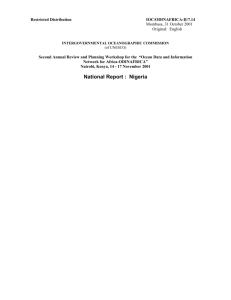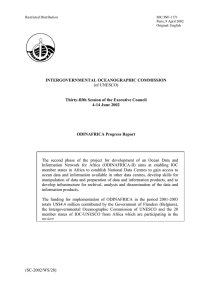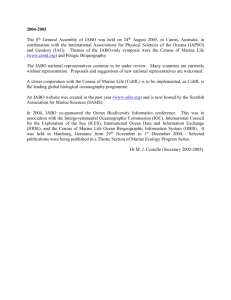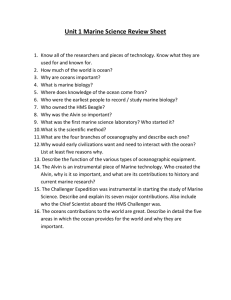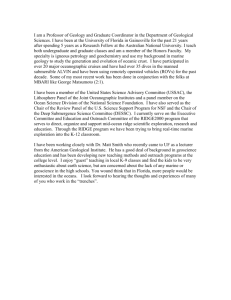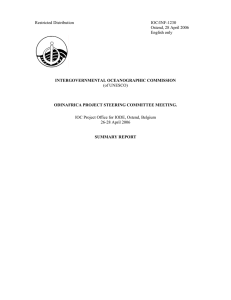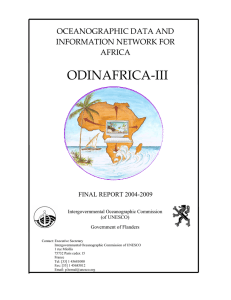Limited Distribution IOC/IODE-XVII/24 Paris, 27 January 2003
advertisement
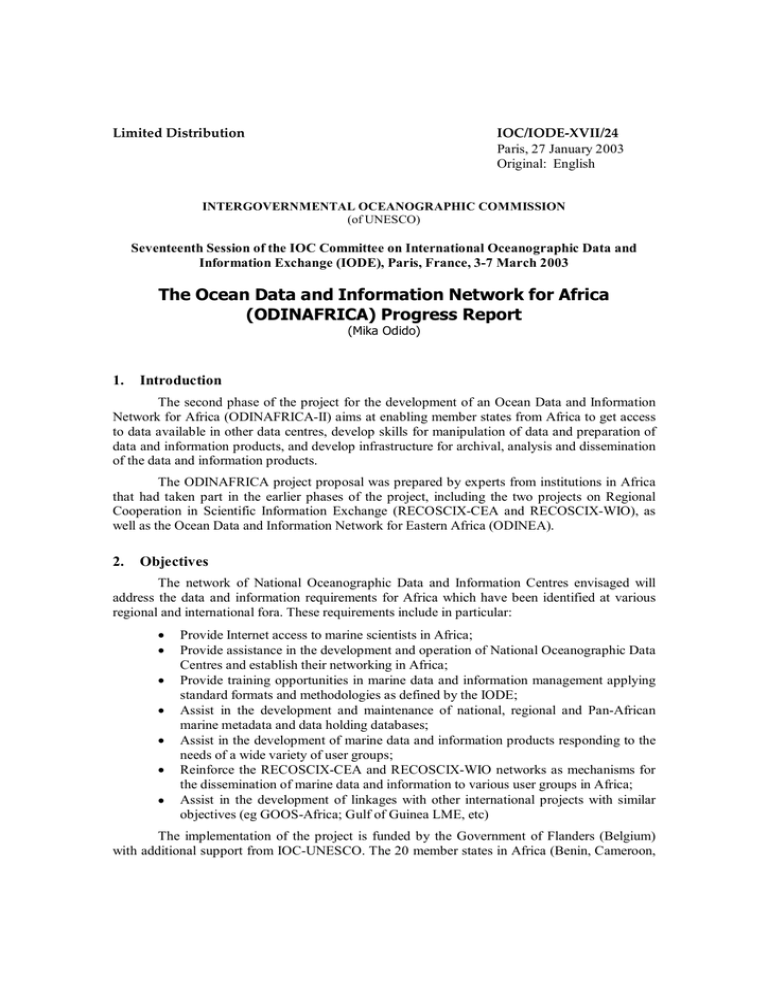
Limited Distribution IOC/IODE-XVII/24 Paris, 27 January 2003 Original: English INTERGOVERNMENTAL OCEANOGRAPHIC COMMISSION (of UNESCO) Seventeenth Session of the IOC Committee on International Oceanographic Data and Information Exchange (IODE), Paris, France, 3-7 March 2003 The Ocean Data and Information Network for Africa (ODINAFRICA) Progress Report (Mika Odido) 1. Introduction The second phase of the project for the development of an Ocean Data and Information Network for Africa (ODINAFRICA-II) aims at enabling member states from Africa to get access to data available in other data centres, develop skills for manipulation of data and preparation of data and information products, and develop infrastructure for archival, analysis and dissemination of the data and information products. The ODINAFRICA project proposal was prepared by experts from institutions in Africa that had taken part in the earlier phases of the project, including the two projects on Regional Cooperation in Scientific Information Exchange (RECOSCIX-CEA and RECOSCIX-WIO), as well as the Ocean Data and Information Network for Eastern Africa (ODINEA). 2. Objectives The network of National Oceanographic Data and Information Centres envisaged will address the data and information requirements for Africa which have been identified at various regional and international fora. These requirements include in particular: • • • • • • • Provide Internet access to marine scientists in Africa; Provide assistance in the development and operation of National Oceanographic Data Centres and establish their networking in Africa; Provide training opportunities in marine data and information management applying standard formats and methodologies as defined by the IODE; Assist in the development and maintenance of national, regional and Pan-African marine metadata and data holding databases; Assist in the development of marine data and information products responding to the needs of a wide variety of user groups; Reinforce the RECOSCIX-CEA and RECOSCIX-WIO networks as mechanisms for the dissemination of marine data and information to various user groups in Africa; Assist in the development of linkages with other international projects with similar objectives (eg GOOS-Africa; Gulf of Guinea LME, etc) The implementation of the project is funded by the Government of Flanders (Belgium) with additional support from IOC-UNESCO. The 20 member states in Africa (Benin, Cameroon, IOC/IODE-XVII/24 Page 2 Comores, Côte d'Ivoire, Gabon, Ghana, Guinea, Kenya, Madagascar, Mauritania, Mauritius, Morocco, Mozambique, Nigeria, Senegal, Seychelles, South Africa, Tanzania, Togo, Tunisia) are providing counterpart contributions covering staff costs, utilities and some of the costs related to implementation of the project locally. Training and capacity building are a core element of the project and are being provided by experts from institutions in Belgium, India, United Kingdom and United States of America. 3. Implementation of the Project The commencement of implementation of the second phase of ODINAFRICA was rescheduled due to delays in transfer of the funds to the Intergovernmental Oceanographic Commission of UNESCO. Though it had been envisaged that the project would commence in May 2000, it was not until August that the funds were transferred to UNESCO. Due to the already tight schedule planned for the second half of the year, including the sixteen session of IODE and the final workshop for the Ocean Data and Information Network for Africa, Phase 1, it was not possible to start the implementation of planned activities. The coordinators, in consultation with the participating institutions decided to defer the commencement of the project to January 2001. Consequently all the activities planned for 2000 were moved forward. In the first year of implementation of the project (2001), a considerable amount of resources was spent on procurement of equipment and software, as well as setting up of data and information centres. The funds allocated to training and development of services and products increases progressively during the implementation of the project. These two items (training and services/products) are allocated the bulk of the funds available (42%). There were delays in processing of contracts for 2002. This was partly due to implementation of the new UNESCO Financial Management Systems (FABS). Nevertheless the level of implementation remained high (95% for joint activities and (70%) for national activities) due to the assistance provided by several UNESCO Field Offices such as Nairobi, Windhoek, Dakar, Yaounde, Dar es Salaam, Rabat, and Conakry who were able to process contracts during the first semester of 2002 when FABS was not operational. The focus during this year was on identification of priority data and information services/products for each country. The data management training also focussed on development of products such as national marine atlases, while the information management training focussed on development of library catalogues and establishment of an integrated library management system using INMAGIC. 3.1 Establishment and operation of national oceanographic data and information centres. The member states that had not established NODCs/DNAs at the start of the current phase (ODINAFRICA-II, 2001-2003) of the project were provided with support to organise national coordination meetings. These meetings are used to identify a suitable national host institution for the NODC/DNAs as per IODE guidelines as well as to brief stakeholders in the participating countries on the objectives of the ODINAFRICA project and the IODE system. Several countries organised the coordination meetings in order to ‘restart’ centres that had become moribund. Participating countries were encouraged to base the data and information centres in the same institutions (Participating institutions listed in Annex I). National Oceanographic Data and Information Centres have now been formally established in most of the countries participating in the project. These are networked through the ODINAFRICA project and an electronic mailing list was provided to encourage communication between the partner institutions. Support from the project enabled the centres to cater for a wide range of activities such as operational expenses (including internet connection), development of IOC/IODE-XVII/24 Page 3 meta databases and data archives, development of data and information products, and public awareness creation on the projects products and services. The project places emphasis on the development of products and services that can lead to, or at least assist in self reliance which will ensure sustainability of the centres beyond the project period. However the participating institutions have agreed that data should not be given a monetary value and that the current IOC policy on “full and open access” to data should be followed. Data and Information Products that are valuable to the whole network, especially those whose production has been funded by UNESCO/IOC should also be freely exchanged. In order to improve networking, the ODINAFRICA institutions were encouraged to initiate joint activities, which would enable them to share resources and expertise. In this regard databases developed at national level (such directories, meta databases, library catalogues etc) will be availed on the Internet via the IOC server in order to encourage broader usage. These databases and other services and products offered by each centre will be catalogued and the information provided to all the partners. 3.2 Training and Follow-up support Data Management Training Course: The marine data management training curriculum developed by the IOC’s International Oceanographic Data and Information Exchange Program (IODE) is based on an extensive collation of international public documents on marine data, formats, software, program and data management procedures, manuals, protocols, and associated tutorials. The main collection, entitled the IODE OceanTeacher system, is a 600 megabyte CDROM that has been under development by the IOC training staff since 1997. It is accompanied by data CDs, that contain data sets relevant to the two regions covered by ODINAFRICA, ie IOCINCWIO and IOCEA. The CD-ROMs are the principal training resource used during data management courses. The OceanTeacher is also available through the Internet: http://www.oceanteacher.org Participants in the training courses are furthermore encouraged to use the OceanTeacher system to refresh and continiuously update their knowledge. The first ODINAFRICA-II Training Workshop in Marine Data Management, held in Casablanca, Morocco, April 2-13, 2001, was designed to provide participants with knowledge and skills in the following areas: Basic computer skills; the importance of marine data in general, and particularly within participants’ national and regional environments; how to set up an oceanographic data center within the IODE System; infrastructure requirements, including hardware and software tools; how to manipulate and analyze the principal types and formats of marine data ; and how to produce ocean data products and to disseminate the products, both over the Internet and by traditional methods. The second course in Tunis, Tunisia 29 April- 10 May 2002 covered: setting up and use of Internet clients for WWW browsing and emailfundamentals of data analysis (document and spread sheets formatting, creation of hydrographic datasets, gridding), development of metadata-base and data archives; use of GIS (creation of GIS files, image and data synthesis); preparation of project proposals. Marine Information Management Training Course: The IODE OceanTeacher has a Marine Information Management training module on which the ODINAFRICA training courses are based. The first training course was held from 29 October- 9 November 2001 at the Research Aquarium of the Directorate of Marine & Coastal Management in Cape Town South Africa and focused on basic skills in Marine Information Management, including introduction to Information Technology and development of library catalogues using INMAGIC which is an Integrated Library Management Software. The second course, hosted by the Institut National des Sciences et Technologies de la Mer, (INSTM) in Tunis, Tunisia from 29 April – 10 May 2002 covered further training on utilizing INMAGIC (cataloguing, web-upload, serials management), setting up user IOC/IODE-XVII/24 Page 4 services, information seeking in an electronic environment, and exploitation of information resources in marine sciences. Follow-up Support: In order to ensure standardization of software, formats methodology as well as training curricula, and to enable students to undertake self-study subsequent to group training courses, the OceanTeacher system was developed, as described above. In addition a small team of experts was contracted to provide internet-based (email) follow-up and support, including maintaining an ‘ODINAFRICA Help Desk’. They ensures that the trainees can make optimum use of the knowledge gained during the training course and it ensures full implementation of take home’ tasks assigned during the course. The experts involved are some of the trainers used during the training courses. The training and follow-up support has equipped the data and information managers with the tools to effectively manage their centres and develop relevant data and information products for their users. However wide disparities in knowledge, capability and background of the trainees as well as the difference in sizes and focus of the libraries and data centres provided a challenge to the resource persons. Several options were considered to assist the institutions, which are lagging behind. These include use of advanced students to train others. A glossary of technical terms should be prepared and distributed during the training course. This will particularly be useful for the students who are not proficient in English. Efforts should also be made to identify French speaking resource persons to assist with the data management training. 3.3 Sourcing of data and information and development of databases. The institutions participating in ODINAFRICA have been provided with a data CD containing data from the IOCEA and IOCINCWIO regions obtained from other IODE data centres around the world. This will enable the African data centres to provide access to a wide range of data to their users. In addition there is an on-going programme to identify, digitise and repatriate other datasets which are available in foreign institutions to the regions. This is done within the framework of the GODAR programme. In addition of course, the data centres will receive, quality control, archive and make available data collected by national scientists. Each data centre participating in the project is developing a metadata-base containing information on location and availability of marine and coastal data/information in the respective countries using the MEDI format. The national and regional metadata-base will be availed on the project website when completed. The development of national data archives is an important component of the project. The priority data types for each centre will be decided upon at the national level. Some of the countries have opted for a distributed system of data centres where each research institution archives its own data (but in close consultation and collaboration with the NODC/DNA), while in other countries the designated NODC is the depository for all the data. 3.4 Development and dissemination of services and products The identification of services and products required at the national level is crucial in deciding the priorities of the centres. Resources have therefore been allocated to enable each of the institutions to organise a national workshop to identify these requirements. Support for development of specific data and information products has enabled institutions to prepare data summaries, national oceanographic data CDs, national marine atlases, and reports based on analysis of some of the data sets. The RECOSCIX networks have already pioneered in the provision of information services and products through the two regional dispatch centres (RDC) located at the Kenya IOC/IODE-XVII/24 Page 5 Marine & Fisheries Research Institute (KMFRI) in Mombasa, Kenya and Centre de Recherches Océanologiques (CRO) in Abidjan, Côte d’Ivoire. The information services and products offered by the centres include: (i) a document delivery service to marine scientists in Africa; (ii) circulation of lists of recent additions to the RDC collection such as reprints, and contents of journals received; (iii) maintenance of a merged catalogue of holdings of several marine science libraries in the region to enable access to documents available in the libraries; (iv) development and maintenance of database of publications about marine and freshwater science in Africa; (v) a directory of marine and freshwater professionals in Africa, which is part of GLODIR. The database also includes recent publications of the professionals; (vi) exposure of marine science publications in the region through their inclusion in the Aquatic Sciences and Fisheries Abstracts (ASFA) database; (vii) a directory of marine, coastal and freshwater research institutions and information centres in Africa; (viii) a newsletter (WINDOW) published 3-4 times a year in English and French provides information on marine sciences issues relevant to the region; and (ix) maintenance of the project website (www.odinafrica.net) that provides information to the project partners such as copies of national reports, annual reports, addresses of partners, activities calendar, information on workshops etc. The project is currently investigating ways of enabling the partner institutions to access electronic journals though regional initiatives such as the International Network for Access to Scientific Publications (INASP). The third session of the ODINAFRICA planning and review workshop noted that the trend is increasingly towards the creation of virtual libraries. The session recommended that a feasibility study on the establishment of a repository and e-journals should be conducted. The study will identify the facilities required, and mechanisms for peer review for the articles. The possibility of collaboration with POGO in this endeavour should be investigated. In order to create awareness of the services and products available through the network, the projects activities have been published through brochures, information sheets, data summaries, calendars, meetings/seminars, lectures to educational institutions, and meetings with key government officials. 3.5 Linkages with other programmes/project There are several regional or international programmes and other initiatives that address coastal and marine environmental issues in Africa. Their effectiveness depends on their ability to share information across national, sectoral and disciplinary boundaries. ODINAFRICA should play an active role in the development of the data management plans for such programmes and also provide the mechanism for an exchange of information between individuals and organisations through its wide network. In this regard ODINAFRICA is an active participant in other IOC initiatives such as GOOS Africa, IOGOOS, and the UNESCO Ocean Portal. Other programmes with which ODINAFRICA is establishing linkages include: the African Process for the Development and Protection of the Coastal and Marine Environment, Abidjan and Nairobi Conventions (UNEP Regional Seas Programme), International Ocean Institute (IOI), the Gulf of Guinea Large Marine Ecosystem Project (GOG-LME), Western Indian Ocean Marine Science Association (WIOMSA), Secretariat for Eastern Africa Coastal Area Management (SEACAM). ODINAFRICA is also involved in the establishment of the Institut Afro Japonais des Sciences et Techniques de l’Océan (AJIOST) which is being spearheaded by Tunisia. The association, which will be based in Tunis, Tunisia will formulate collaborative research programmes between African coastal countries and Japan. It will particularly involve the countries participating in ODINAFRICA, and will rely on the network of National Ocean Data and Information Centres (NODCs) and African experts developed with the framework of the ODINAFRICA project. IOC/IODE-XVII/24 Page 6 4. External Evaluation of the ODINAFRICA Project The Government of Flanders commission two experts Dr G. L. Holland and Dr H.S. Wheater to perform and evaluation of the Flanders UNESCO Science Trust Fund (FUST) through which the ODINAFRICA project is funded. The primary purpose of the evaluation is to provide advice to the Government of Flanders and UNESCO concerning the extension of the FUST agreement. The evaluators made the following recommendations: • • • • • • Complementary proposals, below an agreed maximum amount, should be supported from the accrued interest on the Trust Fund. Part of the management fee for the Trust Fund, combined with the considerable expertise present in the UNESCO Bureau for Extra budgetary Funding, should be used to find additional funding partners. The efforts to increase the participation of African States must be continued. The cost and advantages of satellite communication should be investigated. An effort should be made to increase the number of contributing institutes in developed countries. Regional managers and the ODINAFRICA Co-ordinators should be funded to organise regional activities and workshops and to prepare materials for basic instruction. The evaluators found that the first phase of the FUST Agreement has been successful, despite some delays in the completion of projects due to start-up difficulties in the transfer of funds. Individual projects under the Agreement have been well managed and the desired results have been achieved. Important contributions have been made to the general programme objectives, as well as to the specific project deliverables. The evaluators agree that the success of the respective programmes warrants the continuation of the Agreement. 5. Financial Report Budget Table ODINAFRICA-II: budget planning 2000-2003 (before rescheduling) Counter part contributions from participating member states from Africa Contribution IOC Contribution of external expertise partners Contribution of Flemish government project expenses 10% overhead for Flemish contribution TOTAL PROJECT BUDGET 2000 478584 2001 337803 2002 336153 2003 336673 TOTAL 1489213 87390 41900 109388 41900 99388 41900 99388 41900 395554 167600 302997 530395 621395 651588 2106375 30300 53040 62140 65159 210638 941171 1072526 1160976 1194708 4369380 IOC/IODE-XVII/24 Page 7 ODINAFRICA planned budgets Amount budgetted in US dollars (minus counterpart contribution & external expertise 250000 200000 Planning & Review workshop 150000 NODC equipment & operations Project administration Training & Follow-up support 100000 Data and databases 50000 Services & products 0 2000 2001 2002 2003 year Chart 1 Allocation of funds for ODINAFRICA II 7% 25% 17% Planning & Review w orkshop Project administration NODC equipment & operations Training & Follow -up support 12% 17% Data and databases Services & products 22% Chart 2 6. Requested Actions from the Committee The Committee is requested to: • • • [end] Review progress made in the implementation of the ODINAFRICA project; Provide guidance on further development, taking into account the report of the external evaluation; Provide guidance on the submission of a Phase-III project proposal to donors, with special emphasis on the role of the data and information centres in national, regional and global ocean science and service programmes.
